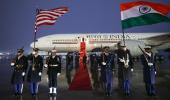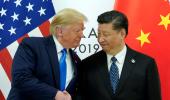We must bring a laser focus on our own interests, and define our friends and foes more clearly instead of trying to live by somebody else's rules.
We must grow up, think for ourselves, think India First, asserts R Jagannathan.

A 78-year-old man living in a white building is sending shockwaves through his own country as well as the rest of the world.
Since assuming office as US president, Donald Trump is packing off illegal migrants by the thousand every day, has scrapped affirmative action programmes in federal institutions, withdrawn from the Paris Climate Accord and the World Health Organization, suspended aid to developing countries, sacked thousands of federal employees, and imposed massive tariffs on trade partners (Canada and Mexico) and rivals (China).
And this is just the beginning.
India will come on his radar soon, but while we wait for Mr Trump's other disruptive shoes to drop, taking a helicopter view of his actions serves us better than reacting in a knee-jerk fashion.
Unlike last time, Mr Trump has been a blur of action precisely because he understands that many of his decisions will eventually be challenged and neutered by the 'system'.
His window for action is three to six months, after which the courts, the Democratic opposition, and others impacted by his policies will push back hard.
Also, as someone who believes in deal-making, his initial posture may simply be a bargaining chip (the Mexico and Canada tariffs are already temporarily suspended after back-channel talks).
But, above all, Mr Trump is sending a message to his voters that he is doing everything he promised, even if some of it later comes unstuck. Failures can always be blamed on his enemies.
Despite short-term disruptions, it is premature to conclude that Mr Trump will do more harm than good.
Some disruption is needed right now to get both geopolitics and economics back into some kind of commonsensical framework.
We in India need to also begin conversations on difficult topics that we have avoided so far, thanks largely to a left-liberal consensus on how the world should be run.
That world was make-believe, and had begun crashing all around us -- if only we had cared to notice.
Consider the scenario before Mr Trump.
We have had two costly wars going on, globalisation is falling apart, illegal immigration is getting out of hand and damaging social cohesion, and the only way of keeping economies ticking is by printing more money and raising unsustainable debt. Business as usual will not deliver.
Thanks to Mr Trump, we can talk about nationalism without being apologetic, we can question blind assumptions about climate change and net-zero targets, weigh the advantages and disadvantages of mindless affirmative action in education and jobs, dispute the benefits of globalisation and free trade, and discuss the negative potential of too much immigration in too short a time.
We need to discuss the tradeoffs we ignored and the negative externalities we created while willy-nilly accepting the old policy consensus.
My conclusions about the Trump effect are given below in bullet points, with some explanations.
One, America First means the US will adopt a more isolationist stance, and the strategic focus will be on dominating the Americas, north and south.
Mr Trump is effectively harking back to the 19th-century James Monroe Doctrine, under which the US designated the Americas as Uncle Sam's backyard.
Hence the threats to Canada and Mexico, and the offer to buy Greenland.
Two, higher tariffs mean the world trade will slow down and all countries will have to rely on domestic demand for growth.
On the plus side, it will give us opportunities to work out new trade alliances and free trade agreements with preferred partners, including the US.
It is an opportunity to build a fairer international regime where there are mechanisms to track winners and losers and compensate the latter in some way. The open trading system has no guardrails.
Three, America's exit from the Paris Accord and WHO will give us an opportunity to rethink climate policies and question the utility of net-zero targets.
These targets are anyway too distant to matter (India's target is 2070) and none of those advocating such policies will be around to defend their forecasts or apologise for their mistakes.
Health policies will be determined by national priorities, and not global bureaucracies.
At some point, when we are a $10 trillion economy, we too should threaten to stop paying our dues to the United Nations or send troops for peace-keeping operations elsewhere without a permanent seat on the Security Council.
Four, borders and immigration control must matter to all.
It is not only Mr Trump who is worried about excessive immigration and demographic change.
The whole of Europe is worried too, and so is India. The big Asian countries (China, Japan, the Koreas, Vietnam, among others), allow practically no immigration.
We need rational immigration policies and not the irrational ones preferred by left-liberals who use undocumented migrants as vote banks.
Five, the US exit from DEI (diversity, equity, inclusion) is again an opportunity to examine which policies actually work in achieving fairer social and economic outcomes.
There can be no social stability if too many people are marginalised and left behind.
However, there are costs to carrying the DEI mantra too far as this works against competence and merit -- and the US was beginning to feel the pinch.
The pushback against DEI is also good for desis in the US, who were beginning to be targeted by woke liberals on the basis of caste.
We are, of course, the global headquarters of hardwired DEI.
Politically, there is no way we can abandon quotas, but we must begin to ask questions about whether there are better ways of ensuring diversity and inclusion without expanding quotas, and organise pilot projects to offer alternatives.
The arrival of Mr Trump in the White House is a nudge to work out better ideas when the old ones aren't delivering.
We can spend the coming months fretting about what Mr Trump will do to us, or we can seize the opportunity to reassess our worst policies -- from protectionism to endless quota-mongering.
If we focus on making the Indian economy free enough to create millions of new jobs, the quota pressures will ease.
The bottom line is this: When the old Washington Consensus (on tariffs, free trade, globalisation, budget deficits, privatisation, deregulation, competition, and related policies) has been abandoned by Washington itself, why do we need to bat for the same?
We must bring a laser focus on our own interests, and define our friends and foes more clearly instead of trying to live by somebody else's rules.
We must grow up, think for ourselves, think India First.
R Jagannathan is a senior journalist
Feature Presentation: Aslam Hunani/Rediff.com












 © 2025
© 2025